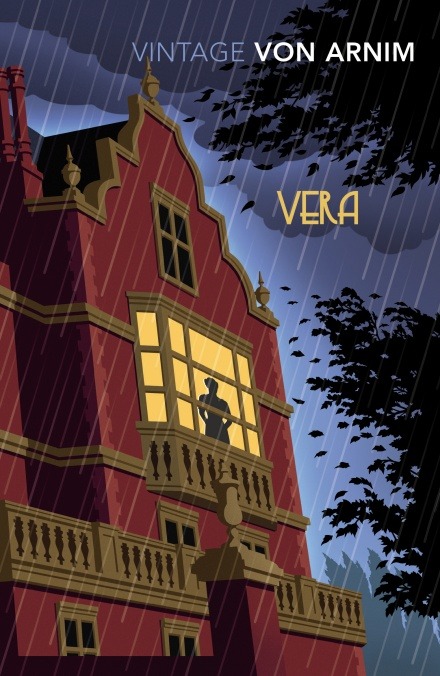As you may know from previous posts, I have been tracing the genetic mutations from which the genre of paranormal romance arose by looking at an earlier manifestation, Gothic romance (or romantic suspense). This genre flourished from about the 1940s to the 1980s and has as its architexts the Brontës’ Jane Eyre (1847) and Wuthering Heights (1847) and, nearer in time Daphne du Maurier’s Rebecca (1938).

This line of research led me to Elizabeth von Arnim’s Vera (1921) which has been claimed as an important influence on du Maurier’s classic romance of a young and vulnerable woman who loves and marries a man whose life is haunted (figuratively) by the powerful presence of his dead first wife, Rebecca.
Vera is a darkly comic transformation of the Gothic romance paradigm. In novels of that genre (and in paranormal romance too), the plot moves towards an overcoming of the otherness of the demonic lover with a promise of mutuality, often involving the redemption or reformation of the man. (This sometimes involves a very dubious sexual politics where, as in Victoria Holt’s aptly named The Demon Lover (1982), the ‘hero’ has abducted and raped the heroine but is transformed by her love.)
In von Arnim’s novel, Lucy Entwhistle, a young woman whose father has just died, is comforted by an older and very self-assured man who is himself bereaved: his wife, Vera has, it is rumoured, committed suicide. The man, Everard Wemmys, courts her and soon marries her. He is genuinely demonic – bullying, rigidly puritanical, monstrously selfish. His dominance (fearful but exciting in Gothic romance) is viciously oppressive, stifling any possibility of mutuality (his conversational style with others reveals this; his silencing of Lucy herself; even the obsessive locking away of the books in the library he doesn’t read). Lucy seems to have had a vaguely academic or bohemian life when her father was alive and his friends visited and is used to free and lively dialogue, but now she is cut off from social life with an egotistically monologic husband. And his monstrosity is singularly without glamour.
The gothicised romance plot typically shows the reformation of the rake (after Samuel Richardson’s Pamela (1740)) or taming of the monster, culminating in marriage. Vera arrives at marriage very quickly and Wemmys’s petty cruelties begin even on their honeymoon (though the reader becomes aware of his despotism even earlier). Von Arnim strips away romantic illusion or utopian possibilities, depicting the horrific afterlife of courtship in a brutally constricting marriage. It is significant that Emily Brontë’s Wuthering Heights is referred to in the novel. This is a key intertext in Gothic and paranormal romance and is a similarly uncomfortable depiction of the interaction of love and violence. (Arnim’s friend John Middleton Murray likened the book to Wuthering Heights as written by Jane Austen, which captures its caustic wit.) The novel lays bare the allure of Gothic/paranormal romance. It is horribly, excruciatingly funny.
Discover more from Open Graves, Open Minds
Subscribe to get the latest posts sent to your email.

Thanks for posting this. Interesting links to ‘Wuthering Heights’ and ‘Rebecca’ but does Vera have any supernatural or folkloric elements to it? Bronte and Du Maurier deliberately evoke ghosts and vampires don’t they? I am intrigued.
Very interesting question! No, it doesn’t have supernatural elements, but it has many Gothic features–the demonic lover, the vulnerability of the heroine, her virtual incarceration, the haunting by the past (and it does use the image of haunting, I think). But the Gothic romance itself (including Rebecca) doesn’t usually have supernatural elements–it invokes them, often very self-consciously recalling Gothic, but then explains them away in the Radcliffean manner. Both Jane Eyre and Wuthering Heights are more like Todorov’s fantastic, where there is an unresolved hesitation between the marvellous (the actual supernatural) and the realm of ordinary natural processes. As for the folkloric, I didn’t notice (though ‘Bluebeard’ is always lurking in these stories)–I’ll have to look again.
I didn’t find it funny at all so much as terrifying and horrific – it’s what we’d call coercive control, with more than a hint of domestic violence. The ending was brutal. I was relieved to read the author had based it on her second marriage as at least I could imagine Lucy escaped in the end…
Oh, I agree that it is horrific, and my review emphasises the horror. But there is a very dark sense of humour there too that Arnim is employing quite deliberately.